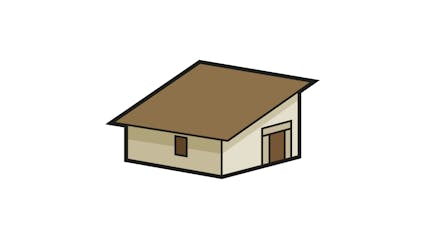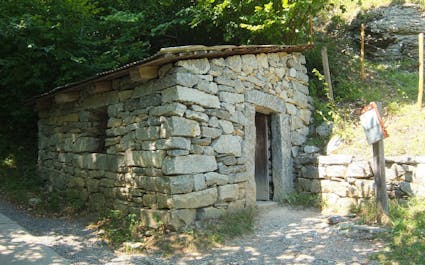891 – Smithy from Bodio TI, 19th Century
The modest smithy kept the quarrying tools of the workers in Bodio in shape.

Local Building Material
Craftsmen erected a uniformly layered masonry wall of dressed granite or gneis. They piled rectangular stone blocks to form massive corners and framed the door openings with long granite blocks – the solid little building is covered with a shed roof, as is common in utility buildings.

Small but Important
The construction of the original Gotthard railway tunnel in 1872–1882 and of its connecting lines required enormous amounts of building material: permanent way, bridges, retaining walls, station buildings – stone such as granite or gneis was the most suitable material. The quarry at Bodio was presumably opened at that time.
The modest smithy kept the quarrying tools in shape: here they were forged, sharpened, repaired; edges were tempered, hammered sharp and rehardened in an oil-filled stone basin. The forge and bellows were portable for use at the rock face.
The railway, having been the godfather of the smithy, dug its grave a hundred years later: the building stood in the way of the new Gotthard base tunnel and it had to go. In 2001 it was transplanted to Ballenberg.
Popular Gneis
Roadways, town squares, schoolhouses, walls, stairs – as cities grew in the 19th century the demand for building materials increased as well. The building style of historicism favoured local goods. Ticinese granite or gneis was solid and in demand; especially in the lower Leventina and adjoining Riviera dozens of bridges were made of it. Export, mainly to the northern part of Switzerland, flourished and reached a maximum around 1900, chiefly due to cheap rail transport. The Ticinese granite industry employed 3,000 hands at the time.
Ballenberg
Swiss Open-Air Museum
Museumsstrasse 100
CH-3858 Hofstetten bei Brienz
Opening hours Administration
3 November 2025 to 8 April 2026
From Monday to Friday
8.30 am to 11.30 am
1.30 pm to 4.30 pm
Opening hours
9 April to 1 November 2026
10 am to 5 pm daily